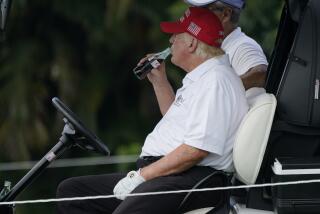Gingrich Blasts Clinton’s Anti-Drug Plan
- Share via
WASHINGTON — President Clinton’s plan for cutting illicit drug use in half over the next decade was harshly attacked Saturday by House Speaker Newt Gingrich (R-Ga.), who ridiculed the proposal as “a hodgepodge of half-steps and half-truths.”
Calling Clinton’s anti-drug strategy a “timetable for defeat,” Gingrich pledged that the Republican-dominated Congress will propose more sweeping legislation to shrink drug use.
Gingrich delivered the GOP response to Clinton’s weekly radio address, which focused on the administration’s anti-narcotics plan. Some details of Clinton’s plan were disclosed last week.
Gingrich’s remarks, also broadcast nationally, were in line with the recent strategy of GOP congressional leaders to target Clinton policy initiatives for criticism while avoiding comment on allegations of personal misconduct swirling around the president.
In Clinton’s speech, he called upon parents to join the government in ridding America of the scourge of drug use and said citizens should recognize “that the fight against drugs must be waged and won at kitchen tables all across America.”
*
Clinton said his new 10-year plan to cut illegal drug use by 50% is based on the “very encouraging news in recent months that more and more of our young people are saying no to drugs” and that overall, the number of Americans who use drugs has fallen by half since 1979.
The recent White House report--composed by Gen. Barry R. McCaffrey, coordinator of drug-control strategy--said that in 1996, 13 million people in this country were drug users, down from a peak of 25 million people in 1979.
The president said his drug-reduction strategy is based on “tougher punishment, better prevention and more partnerships to shut down the international drug trade.”
For the 1999 budget year, which begins Oct. 1, Clinton’s anti-drug plan would cost $17 billion, an increase of $1 billion over current spending.
Key parts of the plan are to send “prevention educators” to 6,500 schools nationwide and to devise an anti-drug media campaign aimed at young people, he said.
On the law enforcement side, Clinton’s plan calls for 1,000 more Border Patrol agents to be hired to help curtail drug smuggling along the border with Mexico. He also is seeking money for improved X-ray technology to help agents inspect large vehicles and railroad cars.
*
Drug testing and treatment of federal prisoners also would be upgraded. He cited a recent Justice Department study showing that inmates who received drug treatment were 73% less likely to be rearrested after their release.
In contrast to Clinton’s assertion that progress has been made in the fight against drugs, Gingrich declared that the battle is “going downhill.”
Gingrich focused on a reversal in trends that began earlier this decade for teenage drug use: After years of decline, the usage rate among teenagers surged.
The increase in “drug use among teens has skyrocketed . . . an unthinkable 70%” since 1992, Gingrich said, and he said “a resounding silence from the White House on drugs” bears part of the blame.
Gingrich declared that Clinton’s 10-year plan aims “to correct some of the damage that his administration has already done.”
Administration officials have acknowledged concern about teenage drug use, but they were encouraged by a recent study showing that drug use among younger teenagers appears to be leveling off.
For older teens, the picture was mixed: Marijuana use is still ticking upward, but the use of other illicit drugs is growing little or not at all, a White House study showed in December.
“The Clinton administration must do more than defend the status quo,” Gingrich said.
Referring to the results of various polls and studies, he said: “When nine out of 10 high school seniors tell us it is easy to obtain marijuana, clearly we are not doing enough. . . . When eighth-grade use has increased by 150% since 1992, clearly we are not doing enough.”
Declaring that Clinton’s plan will be “dead on arrival in this Congress,” Gingrich pledged to seek passage of “the largest, most dynamic, most comprehensive anti-drug strategy ever designed.”
Gingrich provided no details or funding estimates, only the general outlines of his approach.
“We will provide market incentives so that businesses create drug-free workplaces that will help save lives, reduce accidents and lower health-care costs,” he said.
He also said: “Working with groups like the Fellowship of Christian Athletes, we will help communities build the anti-drug coalitions that have proven our most effective tool in keeping young people off drugs.”
More to Read
Get the L.A. Times Politics newsletter
Deeply reported insights into legislation, politics and policy from Sacramento, Washington and beyond. In your inbox twice per week.
You may occasionally receive promotional content from the Los Angeles Times.










